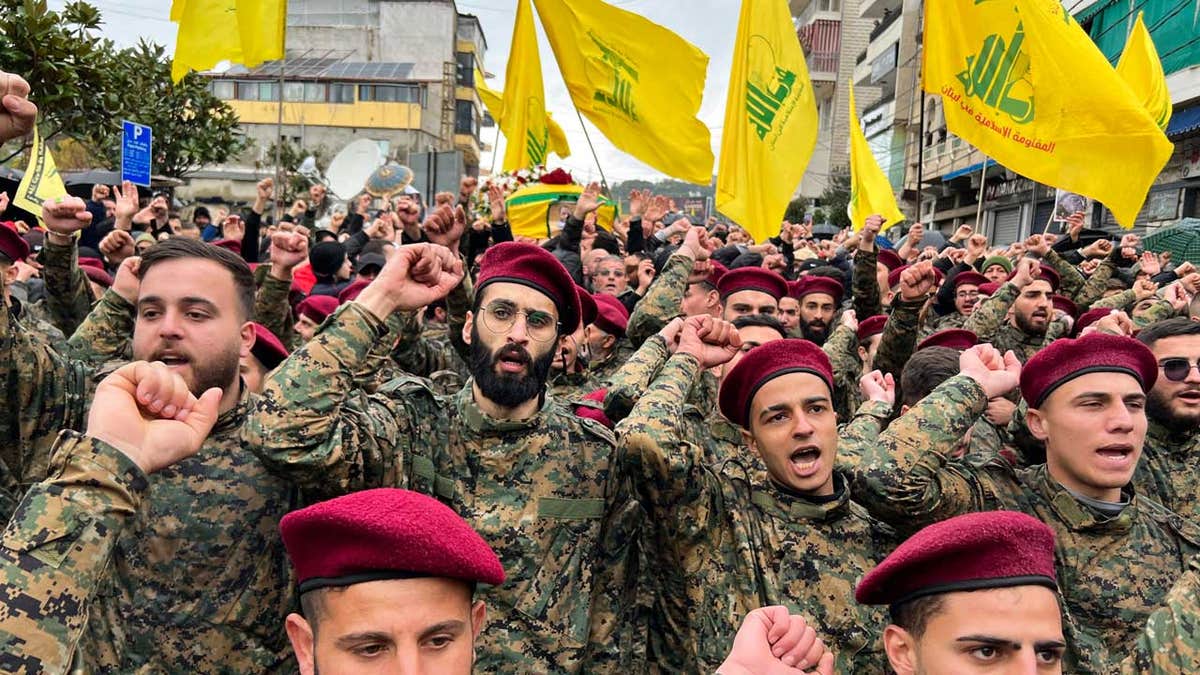close 
Fox News Flash top headlines for March 15
Fox News Flash top headlines are here. Check out what’s clicking on Foxnews.com.
With ally Hamas under attack in Gaza, the head of Iran’s Quds Force visited Beirut in February to discuss the risk posed if Israel next aims at Lebanon’s Hezbollah, an offensive that could severely hurt Tehran’s main regional partner, seven sources said.
In Beirut, Quds chief Esmail Qaani met Hezbollah leader Sayyed Hassan Nasrallah, the sources said, for at least the third time since Hamas’ deadly Oct. 7 attacks on southern Israel and Israel’s devastating retaliatory assault on Gaza.
The conversation turned to the possibility of a full Israeli offensive to its north, in Lebanon, the sources said. As well as damaging the Shi’ite Islamist group, such an escalation could pressure Iran to react more forcefully than it has so far since Oct. 7, three of the sources, Iranians within the inner circle of power, said.
BIDEN ADMIN UNDER PRESSURE TO STOP BILLIONS OF DOLLARS IN SANCTIONS RELIEF TO IRAN
Over the past five months, Hezbollah, a sworn enemy of Israel, has shown support for Hamas in the form of limited volleys of rockets fired across Israel’s northern border.
At the previously unreported meeting, Nasrallah reassured Qaani he didn’t want Iran to get sucked into a war with Israel or the United States and that Hezbollah would fight on its own, all the sources said.
“This is our fight,” Nasrallah told Qaani, said one Iranian source with knowledge of the discussions.
Calibrated to avoid a major escalation, the skirmishes in Lebanon have nonetheless pushed tens of thousands of people from their homes either side of the border. Israeli strikes have killed more than 200 Hezbollah fighters and some 50 civilians in Lebanon, while attacks from Lebanon into Israel have killed a dozen Israeli soldiers and six civilians.
In recent days, Israel’s counter-strikes have increased in intensity and reach, fueling fears the violence could spin out of control even if negotiators achieve a temporary truce in Gaza.
Israeli Defence Minister Yoav Gallant indicated in February that Israel planned to increase attacks to decisively remove Hezbollah fighters from the border in the event of a Gaza ceasefire, although he left the door open for diplomacy.

Hezbollah militants gather to pay their respects to one of the group’s commanders. Ali al-Debs was killed by an Israeli air raid in Lebanon’s southern city of Nabatieyh on February 16, 2024. (MAHMOUD ZAYYAT/AFP via Getty Images)
In 2006, Israel fought a short but intense air and ground war with Hezbollah that was devastating for Lebanon.
Israeli security sources have said previously that Israel did not seek any spread of hostilities but added that the country was prepared to fight on new fronts if needed. An all-out war on its northern border would stretch Israel’s military resources.
Iran and Hezbollah are mindful of the grave perils of a wider war in Lebanon, two of the sources aligned with the views of the government in Tehran said, including the danger it could spread and lead to strikes on Iran’s nuclear installations.
The U.S. lists Iran as a state sponsor of terrorism and has sought for years to rein in Tehran’s nuclear program. Israel has long considered Iran an existential threat. Iran denies it is seeking a nuclear weapon.
For this story, Reuters spoke to four Iranian and two regional sources, along with a Lebanese source who confirmed the thrust of the meeting. Two U.S. sources and an Israeli source said Iran wanted to avoid blowback from a Israel-Hezbollah war. All requested anonymity to discuss sensitive matters.
CRITICS SLAM BIDEN ADMIN FOR WAIVER THAT GIVES IRAN ACCESS TO $10B FUND: ‘ABSOLUTELY OUTRAGEOUS’
The U.S. State Department, Israel’s government, Tehran and Hezbollah did not respond to requests for comment.
The Beirut meeting highlights strain on Iran’s strategy of avoiding major escalation in the region while projecting strength and support for Gaza across the Middle East through allied armed groups in Iraq, Syria and Yemen, analysts said.
Qaani and Nasrallah “want to further insulate Iran from the consequences of supporting an array of proxy actors throughout the Middle East.” said Jon Alterman of Washington’s Center for Strategic and International Studies think tank, responding to a question about the meeting.
“Probably because they assess that the possibility of military action in Lebanon is increasing and not decreasing.”
Already, Tehran’s carefully-nurtured influence in the region is being curtailed, including by Israel’s offensive against Hamas along with potential U.S.-Saudi defense and Israel-Saudi normalization agreements, as well as U.S. warnings that Iran should not get involved in the Hamas-Israel conflict.
IN ISRAEL’S SIGHTS
Qaani and Nasrallah between them hold sway over tens of thousands of fighters and a vast arsenal of rockets and missiles. They are main protagonists in Tehran’s network of allies and proxy militias, with Qaani’s elite Quds Force acting as the foreign legion of Iran’s Revolutionary Guards.
While Hezbollah has publicly indicated it would halt attacks on Israel when the Israeli offensive in Gaza stops, U.S. Special Envoy Amos Hochstein said last week a Gaza truce would not automatically trigger calm in southern Lebanon.
Arab and Western diplomats report that Israel has expressed strong determination to no longer allow the presence of Hezbollah’s main fighters along the border, fearing an attack similar to Hamas’ incursion that killed 1,200 people and took 253 hostages.
Israel’s retaliatory assault in Gaza has killed more than 31,000 Palestinians and laid waste to the coastal enclave.
“If there is a ceasefire in (Gaza), there are two schools of thought in Israel and my impression is that the one that would recommend continuing the war on the border with Hezbollah is the stronger one,” said Sima Shine, a former Israeli intelligence official who is currently head of the Iran program at the Institute for National Security Studies:
A senior Israeli official agreed that Iran was not seeking a full-blown war, noting Tehran’s restrained response to Israel’s offensive on Hamas.
“It seems that they feel they face a credible military threat. But that threat may need to become more credible,” the official said.
Washington, via Hochstein, and France have been working on diplomatic proposals that would move Hezbollah fighters from the border area in line with U.N. resolution 1701 that helped end the 2006 war, but a deal remains elusive.
“FIRST LINE OF DEFENCE”
A war in Lebanon that seriously degrades Hezbollah would be a major blow for Iran, which relies on the group founded with its support in 1982 as a bulwark against Israel and to buttress its interests in the broader region, two regional sources said.
“Hezbollah is in fact the first line of defense for Iran,” said Abdulghani Al-Iryani, a senior researcher at the Sana’a Center for Strategic Studies, a think tank in Yemen.
If Israel were to launch major military action on Hezbollah, the Iranian sources within the inner circle of power said, Tehran may find itself compelled to intensify its proxy war.
An Iranian security official acknowledged however that the costs of such an escalation could be prohibitively high for Iran’s allied groups. Direct involvement by Iran, he added, could serve Israel’s interests and provide justification for the continued presence of U.S. troops in the region.
Given Tehran’s extensive, decades-long ties with Hezbollah, it would be difficult, if not impossible, to put distance between them, one U.S. official said.
Since the Hamas attack on Israel, Iran has given its blessing to actions in support of its ally in Gaza: including attacks by Iraqi groups on U.S. interests. It has also supplied intelligence and weapons for Houthi operations against shipping in the Red Sea.
But it has stopped well short of an unfettered multi-front war on Israel that, three Palestinian sources said, Hamas had expected Iran to support after Oct. 7.
Before the Beirut encounter with Nasrallah, Qaani chaired a two-day meeting in Iran in early February along with militia commanders of operations in Yemen, Iraq and Syria, three Hezbollah representatives and a Houthi delegation, one Iranian official said.
Revolutionary Guard’s Commander-in-Chief Major General Hossein Salami was also present, the official said. Hamas did not attend.
“At the end, all the participants agreed that Israel wanted to expand the war and falling in that trap should be avoided as it will justify the presence of more U.S. troops in the region,” the official said.
Shortly after, Qaani engineered a pause in attacks by the Iraqi groups. So far, Hezbollah has kept its tit-for-tat responses within what observers have called unwritten rules of engagement with Israel.
Despite decades of proxy conflict since Iran’s 1979 revolution, the Islamic Republic has never directly fought in a war with Israel, and all four Iranian sources said there was no appetite for that to change.
INTERNAL STATE DEPARTMENT MEMO ACCUSED BIDEN OF ‘MISINFORMATION’ ON ISRAEL-HAMAS WAR
According to the Iranian insider, Supreme Leader Ayatollah Ali Khamenei is not inclined to see a war unfold on Iran, where domestic discontent with the ruling system last year spilled over into mass protests.
“The Iranians are pragmatists and they are afraid of the expansion of the war,” said Iryani.
“If Israel were alone, they would fight, but they know that if the war expands, the United States will be drawn in.”
